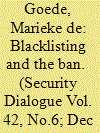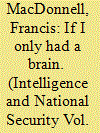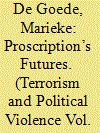|
|
|
Sort Order |
|
|
|
Items / Page
|
|
|
|
|
|
|
| Srl | Item |
| 1 |
ID:
110775


|
|
|
|
|
| Publication |
2011.
|
| Summary/Abstract |
This article examines the practice of targeted sanctions as they are deployed against individuals and groups suspected of financing and facilitating terrorism in Europe. Substantial academic attention and critique has surrounded targeted sanctions and blacklists, as these practices challenge existing logics of evidence, criminal culpability and proportionality. This article seeks to move the analysis of blacklisting beyond the breach of individual rights and toward an understanding of the wider political implications. It draws upon the work of Giorgio Agamben to offer a reading of blacklisting in terms of its symbolic function of banishment and exclusion, which simultaneously redraws the boundaries around normal, valued, ways of life. The article teases out the exceptional and pre-emptive nature of blacklisting as a security measure. It analyses in some detail the Kadi case before the European Court of Justice, and argues that blacklisting and its current contestations work to inscribe the principles of pre-emption into the international juridical order.
|
|
|
|
|
|
|
|
|
|
|
|
|
|
|
|
| 2 |
ID:
164186


|
|
|
|
|
| Summary/Abstract |
E. Y. Harburg, the lyricist behind The Wizard of Oz, remains one of the most important songwriters blacklisted during the Cold War. His removal from Hollywood features in the 1950s denied moviegoers a distinct American voice whose lyrics mixed humor and entertainment to champion liberal causes. From 1944–1972, Director J. Edgar Hoover and the Bureau’s major field offices investigated Harburg. His declassified FBI file shows institutionalized incompetence in the way the Bureau went about writing reports, evaluating evidence, making conclusions, and conducting counter-intelligence work. Harburg’s story illuminates the battle between the left and right to shape popular culture during the Cold War. Hoover and Harburg held opposing views on politics, religion, economics, and race. Yet both men shared a fervent faith in popular culture’s capacity to transform America. Together they vied to remake the nation according to their own distinct visions – Hoover’s fear of declension stood in contrast to Harburg’s hope for radical progress.
|
|
|
|
|
|
|
|
|
|
|
|
|
|
|
|
| 3 |
ID:
159896


|
|
|
|
|
| Summary/Abstract |
Proscription of individuals and groups potentially linked to terrorism in the form of targeted sanctions have become increasingly controversial in recent years, especially in Europe. Initially considered the less violent alternative when countering terrorism, individual proscriptions have become contested for their impact on due process rights and democratic space. This paper focuses on a key aspect of proscription measures that goes relatively unnoticed: its discourses and practices of time and temporality. It analyses in some depth the rationalities of time evoked, debated, accepted, and rejected in two court cases on individual sanctions. It focuses on two elements at work in these cases: first, the relation between the precautionary and the punitive; second, the politics of establishing and examining terrorist intention. In this manner, it contributes to broader literatures on proscription in two ways. First, it advances the debate on security temporalities in general and the discussion of future-oriented sanctions in particular, by focusing on recent cases and case-law. Second, the paper brings a focus on legal practice to proscription debates. The paper concludes that the juridical repertoire of establishing and assessing intentions is not just broadened but fundamentally altered in the current proscription regime.
|
|
|
|
|
|
|
|
|
|
|
|
|
|
|
|
|
|
|
|
|